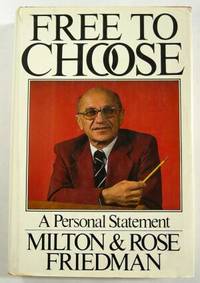 Milton Friedman has died overnight. He was 94. Obituaries everywhere, so I'll just point you to some of the best:
Milton Friedman has died overnight. He was 94. Obituaries everywhere, so I'll just point you to some of the best:- Liberty Scott: "For all of his critics, Friedman was one of the most successful advocates of economic liberty in the world..."
- New York Times: "...the grandmaster of conservative economic theory in the postwar era and a prime force in the movement of nations toward lesser government and greater reliance on free markets and individual responsibility."
- Tyler Cowen: "He was one of the most important minds of the second half of the twentieth century and his influence remains felt all around the world."
- Tyler's blog partner Alex Tabarrok: "Great economist by day and crusading public intellectual by night, Milton Friedman was my hero. Friedman's contributions to economics are profound, the permanent income hypothesis, the resurrection of the quantity theory of money, and his magnum opus with Anna Schwartz, A Monetary History of the United States, 1867-1960, all stand as great achievements."
- Freakanomics author Steven D. Levitt: "He was truly a revolutionary thinker. People do not realize how revolutionary because so many of his ideas that were thought to be crazy when he suggested them eventually came to be seen as obvious..."
- Samuel Brittan in the FT: "Milton Friedman ... was the last of the great economists to combine possession of a household name with the highest professional credentials." (Ignore Brittan's fatuous claim that "only John Maynard Keynes was able to combine a household name with the highest scientific credibility" -- the claim says more about Brittan than you need to know.)
- Wall Street Journal [via Brad de Long]: "...one of the most influential economists of the last century..."
- Peter Boettke: "Today is a VERY sad day for both those who love economic argument and value economic freedom. "
The Cassandra Page describes the effect of Friedman's book Free to Choose on him and his own intellectual development, and he largely speaks for me as well:
I don't know much about his life, but I remember the impact he had on me and my own growth. Friedman's book, "Free to Choose" was one of the first truly conservative books I read as I broke free of the leftist teachings of my public school education almost 25 years ago.You can enjoy Friedman's Nobel Prize acceptance speech here.
As I recall, I never finished the book. By the time I had read most of it, I was so excited by the ideas it presented, I moved on to other, more libertarian works. "Free to Choose" was simple enough for a high school student to understand. The book easily explodes the myths propagated by any unionized teacher regarding economics, politics and even history. With Friedman's help, it was relatively easy for me to "unlearn" the myths I had heard regarding the industrial revolution, the depression, taxes and federal spending.
Free to Choose, in the early 1980's, was like manna in the desert for someone whose only previous exposure to conservatism and conservative economics came from the statements of Ronald Reagan...
Finally, The Cassandra Page also has a series of Friedman quotes to help give you the flavour of the man [hat tip Tim Worstall]:
Hell hath no fury like a bureaucrat scorned.UPDATE 1: I'll just note here, without canvassing all the reasons now, that I wasn't a fully-fledged Milton fan myself. This post helps to explain why: Not PC: Helen Clark and Michael Cullen might like it.
I'm in favor of legalizing drugs. According to my values system, if people want to kill themselves, they have every right to do so. Most of the harm that comes from drugs is because they are illegal.
Many people want the government to protect the consumer. A much more urgent problem is to protect the consumer from the government.
The government solution to a problem is usually as bad as the problem.
The most important single central fact about a free market is that no exchange takes place unless both parties benefit.
UPDATE 2: Just in from Forbes.Com: Former British Prime Minister Margaret Thatcher paid tribute, saying, "Milton Friedman revived the economics of liberty when it had been all but forgotten. He was an intellectual freedom fighter. Never was there a less dismal practitioner of a dismal science."
RELATED: Obituary, Economics, History-Twentieth Century
2 comments:
I've got all teh vids here:
http://mikeenz.blogspot.com/2006/09/google-video-free-to-choose.html
Not sure if they still work - but they did when I posted origionally
Thanks for the research. In the interests of time, I linked you. I think Milton would approve?
Post a Comment